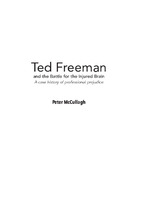Ted Freeman and the Battle for the Injured Brain: A case history of professional prejudice
| dc.contributor.author | McCullagh, Peter | |
| dc.date.accessioned | 2013-11-21 00:00:00 | |
| dc.date.accessioned | 2020-04-01T14:49:59Z | |
| dc.date.available | 2020-04-01T14:49:59Z | |
| dc.date.issued | 2013 | |
| dc.identifier | 459991 | |
| dc.identifier | OCN: 849317095 | en_US |
| dc.identifier.uri | http://library.oapen.org/handle/20.500.12657/33533 | |
| dc.description.abstract | This book recounts some experiences of young Australians with catastrophic brain injuries, their families and the medical system which they encountered. Whilst most of the events described occurred two to three decades ago they raise questions relevant to contemporary medical practice. The patients whose stories are told were deemed to be ‘unsuitable for rehabilitation’ and their early placement in nursing homes was recommended. In 2013, it is time to acknowledge that the adage of ‘one size fits all’ has no place in rehabilitation in response to severe brain injury. Domiciliary rehabilitation, when practicable, may be optimal with the alternative of slow stream rehabilitation designed to facilitate re-entry into the community. Patients’ families were impelled to undertake heroic carers’ commitments as a reaction to nihilistic medical prognoses. It is time for the Australian health care system to acknowledge those commitments, and the budgetary burden which they lift from the system by providing family members with support to retrieve career opportunities, most notably in education and employment, which have been foregone in caring. Medical attendants repeatedly issued negative prognoses which were often confounded by the patient’s long term progress. Hopefully, those undertaking the acute care of young people with severe brain injury will strive to acquire an open mind and recognise that a prognosis based on a snapshot observation of the patient, without any longer term contact provides a flawed basis for a prognosis. The story of these patients and of Dr Ted Freeman has wider implications. | |
| dc.language | English | |
| dc.subject.classification | thema EDItEUR::M Medicine and Nursing::MB Medicine: general issues::MBD Medical profession::MBDC Medical ethics and professional conduct | en_US |
| dc.subject.classification | thema EDItEUR::M Medicine and Nursing::MB Medicine: general issues::MBD Medical profession::MBDP Doctor / patient relationship | en_US |
| dc.subject.classification | thema EDItEUR::M Medicine and Nursing::MK Medical specialties, branches of medicine::MKJ Neurology and clinical neurophysiology | en_US |
| dc.subject.other | doctor-patient relations | |
| dc.subject.other | medical history | |
| dc.subject.other | Brain damage | |
| dc.subject.other | Business in the Community | |
| dc.subject.other | Coma | |
| dc.subject.other | Family (biology) | |
| dc.subject.other | Nursing home care | |
| dc.subject.other | Persistent vegetative state | |
| dc.subject.other | Theodore Freeman | |
| dc.subject.other | Traumatic brain injury | |
| dc.title | Ted Freeman and the Battle for the Injured Brain: A case history of professional prejudice | |
| dc.type | book | |
| oapen.identifier.doi | 10.26530/OAPEN_459991 | |
| oapen.relation.isPublishedBy | ddc8cc3f-dd57-40ef-b8d5-06f839686b71 | |
| oapen.place.publication | Canberra | |
| oapen.remark.public | Relevant Wikipedia pages: Brain damage - https://en.wikipedia.org/wiki/Brain_damage; Business in the Community - https://en.wikipedia.org/wiki/Business_in_the_Community; Coma - https://en.wikipedia.org/wiki/Coma; Family (biology) - https://en.wikipedia.org/wiki/Family_(biology); Nursing home care - https://en.wikipedia.org/wiki/Nursing_home_care; Persistent vegetative state - https://en.wikipedia.org/wiki/Persistent_vegetative_state; Theodore Freeman - https://en.wikipedia.org/wiki/Theodore_Freeman; Traumatic brain injury - https://en.wikipedia.org/wiki/Traumatic_brain_injury |

